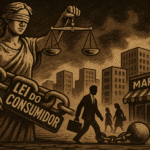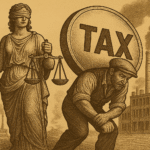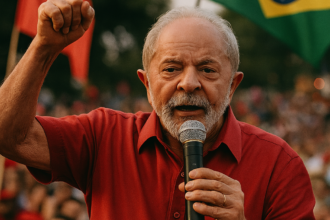The law should be universal, equal for all, blind to social conditions and firm against abuses of power. However, the Brazilian reality reveals a State whose legality is selective: represses the small, tolerates the great; persecutes the weak, protects the strong.
Street vendors are treated like criminals for selling their products on the street. Small businesses are stifled by fines, licenses, regulations and fees. Meanwhile, inefficient state-owned companies and companies with privileged access to political power operate in the red, accumulate debts and remain unpunished — distributing dividends, earning incentives and being treated as untouchables.
Before delving into this analysis, it is worth revisiting two previous blog articles. The first shows how the protectionist discourse can be manipulated to stifle competition and shield inefficient sectors — read Consumer law or weapon against the market?. The second discusses how the national currency itself was debased by the political use of the economy — check it out The Real Scam: How We Destroyed the Value of Our Own Currency.
In this article, we examine how the Brazilian State uses the legal apparatus to sustain a caste economy, where “justice” serves as a tool of social control, and not as a guarantee of freedom or equity.
Street vendors and the force of repression
In urban Brazil, being small means being vulnerable. In a 2017 Rio de Janeiro City Hall operation, dozens of street vendors were violently approached by municipal guards, resulting in the seizure of hundreds of products. The operation took place in broad daylight, under the pretext of combating illegal trade.
“The operation was carried out at various points in the city, resulting in the seizure of 223 products. Among the items collected were clothes, accessories and toys sold without authorization.” — Metro World News No charges of smuggling, theft or threatening public order — just the absence of a license.
Source: Metro World News – Action against street vendors in Rio seizes 223 products
This is the portrait of a State that chooses to punish informality, but does not correct the bureaucracy that generates it. Instead of recognizing the street vendor as someone trying to survive, he is treated as a transgressor.
The other side of legality: the privilege of the big ones
While street vendors have their wares seized and their faces exposed on social media for “violating urban order,” state-owned companies like Petrobras continue to operate with billion-dollar losses — and yet, distribute dividends to their shareholders.
In 2020, at the height of the fiscal crisis and amid a loss of more than R$50 billion in the first half of the year, Petrobras announced the distribution of dividends.
Source: Valor Econômico – Petrobras pays dividends despite losses
The contrast is clear: the small are punished for existing outside the norms, while the big are rewarded for failing within them. When the state participates directly in the economy, it begins to protect its own instruments — even when they operate inefficiently, unsustainably or immorally.
The economy of friends
It is not just about state-owned companies. Large business groups, as long as they are well-connected politically, also enjoy tax breaks, generous credit lines, protection from foreign competition and judicial protection.
Legality, in these cases, becomes defense instrument for those already at the top. Smaller companies, without lobbying, contacts and margins to navigate the system, live under constant threat of punishment, bankruptcy and exclusion.
It is the opposite of the free market. It is a regulatory caste system, where access to “legality” is a tradable currency — not a guaranteed right.
When the State is a partner in its own mistakes
The contradiction is even deeper when we consider that the State, through state-owned companies, also acts as a businessman — but without market discipline. When a state-owned company makes a loss, it does not close down. When it is inefficient, it is not replaced. When it exploits consumers, it does not lose customers: it increases tariffs, redistributes losses and leans on the Treasury.
Petrobras is just one emblematic example. Even though it has been operating with billion-dollar losses for years, its maintenance is treated as “national heritage,” and any attempt at privatization is demonized.
Meanwhile, the street vendor on the corner is prevented from selling water at the traffic lights without a four-part license, a health inspection fee and authorization from the sub-prefecture.
The True Function of Law in a Free Society
The law, in a free society, must protect voluntary contracts, guarantee physical and property integrity, and limit the use of force. It should not be used to regulate who may prosper, who may exist, or who is allowed to serve.
When the law becomes an instrument of privilege, it ceases to be law — and becomes power. And power, as we know, tends to protect itself.
Informality as a legitimate reaction
The high level of informality in Brazil is not a moral problem. It is a reflection of regulatory repression and legal rigidity that only serves the big guys. Street vendors, small traders, service providers and even artisanal producers are outside the legal framework because legality was hijacked by the bureaucratic elite.
Informality is often the only space where there is still freedom. Where citizens can offer something, negotiate, undertake — without asking permission from the Leviathan.
Read also: the article Entrepreneurship in Brazil: where bureaucracy is the biggest competitor, which shows how the regulatory system stifles free initiative even for those who try to act within the law.
Double standards: the structure of hypocrisy
This legal selectivity has a political function: to maintain the discourse of order for the poor and stability for the rich. The same State that represses street vendors for selling pirated headphones has no qualms about subsidizing billion-dollar companies with exemptions, incentives and “tariff adjustments.”
And always with the same excuse: “public interest”.
But what is the public interest, if not the legal pretext for those who already control the system to continue controlling it?
Conclusion: either the law applies to everyone, or it is just another weapon
Inequality in Brazil is not only sustained by the economy — it is reinforced by selective legality. Repression of the informal sector is a form of social control. Forgiving the big sector is a form of institutional protection.
If the law does not apply equally to street vendors and state-owned companies, it is not fair — it is just another instrument of power against the vulnerable.
Read also: the article Billion-dollar subsidies, popular inflation: the (in)visible bill for “state aid”, which exposes how the State transfers wealth from the poor to protected groups; and the text Consumer law or weapon against the market?, which shows how the rhetoric of protection is used to stifle free competition.
📩 Do you want to see how the discourse of legality serves the powerful and penalizes the small?
Subscribe to the newsletter Economic Radar and receive weekly analyses on political economy and the invisible mechanisms of state control.
🔗 References
- Metro World News – Action against street vendors in Rio seizes 223 products
- Valor Econômico – Petrobras pays dividends despite losses



